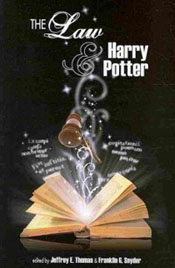Robbins uses characters like Harry Potter in teaching law students the practice of “lawyering,” in which attorneys tell their clients’ stories to a judge or jury. Using these kinds of archetypical characters as guides helps students to learn the basics.
“Storytelling really is part of general lawyering skills, just as much as legal analysis, logic, and argumentation,” says Robbins, who is also director of lawyering programs at the school. "Everything lawyers write about, every argument they make, goes back to a theme and flows like a story.”
Robbins was a biology major in college but she says she was always a big reader. As a law student, she was encouraged to study persuasion to improve her brief-writing skills, and she clerked for a judge who told her that “the story behind the cases was very important to think about,” she says.
She also read a brief by Justice Barry T. Albin, now on the New Jersey Supreme Court, while clerking that “stayed with me because of its storytelling” – a brief that she wrote about in Harry Potter, Ruby Slippers and Merlin: Telling the Client's Story Using the Characters and Paradigm of the Archetypal Hero's Journey, published in the Seattle University Law Review in 2006.
More recently, she contributed a chapter to the book Harry Potter and the Law, published in 2010.
Robbins uses 12 heroic archetypes in her class: warrior, jester, orphan, every person, lover, innocent,scholar, outlaw, ruler, creator, explorer, and magician. All are heroes (hence Harry Potter as orphan hero, not just orphan or hero),By using heroic characters from classic literature and pop culture (others include Merlin the Magician from Arthurian legends, Luke Skywalker from Star Wars, Dorothy Gale from the Wizard of Oz, even Stephen Colbert as an example of a heroic jester) as “pretend” clients, Robbins and the other Camden professors who teach lawyering skills can better instruct their students on how to tell a client’s story in a way that will help him or her win a case.
For example, Robbins says that her students will immediately tell her that Harry Potter is a warrior hero because he fights the battle of good vs. evil. But if Harry Potter was your client, and you were defending his actions, telling the story of the orphan hero would be more effective.
“When you’re thinking of a client you have to understand that your client has many different personas: at work personas, at home persona. Which one of those people do you want to make sure the decider of law really focuses on?” she says. “The story of the lawsuit works toward a resolution that’s going to make sense for the law and this client’s story.”
And in lawyering, that story is the focus: Robbins teaches her students to see their clients as people who want their stories to be told, and that using these heroic archetypes can be guidelines in how to better tell those stories.
The School of Law–Camden offers a course to second- and third-year law students called “Advanced Legal Writing: Constructing Narratives,” but pieces of that course are also being incorporated into other law school classes. Students will revisit the topic in their legal writing, skills, and clinic classes.
The goal of the course is to have the students use narrative reasoning persuasively, even when employing other forms of logic-based reasoning, and to learn these skills before they’re working in the real world, Robbins says.
Because effective storytelling goes hand-in-hand with persuasion, other courses in the Rutgers–Camden law curriculum likewise include it as a focal point. One popular standalone offering is “Persuasion in Legal Writing.” Elements of that course, including storytelling, will be incorporated this fall into the law school’s James Hunter II Memorial Moot Court Program, a series of Rutgers-Camden law school competitions and awards recognizing students who excel in written and oral appellate.
“At Rutgers–Camden, we don’t save the client-centered lessons for the third-year clinic courses,” Robbins notes. “Rather, we are always trying to make sure that every lawyering course we offer – from day one – reminds students to think about the client’s story.”
With an assist from Harry Potter.
– Ed Moorehouse contributed to this article




